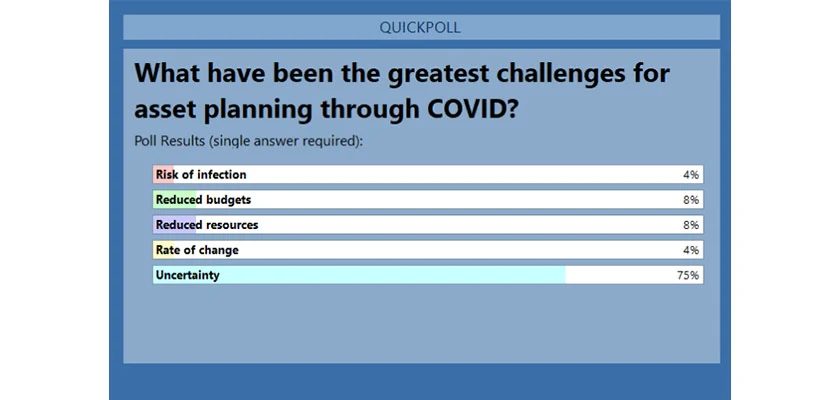Webinar Recap: Future Proofing for Middle East Utilities and Infrastructure
Companies managing critical infrastructure in the Middle East are facing many challenges, including fluctuating oil prices, shifting demographics, and new technologies, which impact their strategic decision-making abilities. Now more than ever, there is mounting pressure on organizations to be able to adapt and justify their plans quickly and continuously.
In a recent webinar hosted by Smart Energy International, Copperleaf was joined by industry experts Stewart Whyte, Head of Network Optimisation at National Grid Electricity Transmission (NGET) and Dr. Najib Dendachi, CEO and Founder of asset management consulting company Al Usul, to discuss some of the regional trends that are challenging asset-intensive organizations today.
Julian Lambert, Copperleaf GM Middle East, led a lively panel discussion on how rapid scenario planning can help organizations improve decision-making agility and transparency during a time of unpredictability and change.
Asset Investment Planning Challenges Through COVID
During a live poll, the audience was asked which of the following has posed the greatest challenge to their asset management operations during the COVID-19 pandemic:
- Risk of infection — the fear that by asking your teams to keep the lights on, you are putting them at risk of contracting COVID-19
- Reduced budgets — having to work with reduced budgets because of an anticipated economic slowdown and cashflow troubles
- Reduced resources — working in new shift pattern to reduce infection risk, or having to deal with key team members being unavailable
- Rate of change — numbers and estimates changing too quickly to manage effectively
- Uncertainty — lack of data about what’s happening today and what will happen in the near future
Overwhelmingly, 75% of the live audience indicated that ‘Uncertainty’ was the most challenging factor they are facing:

Future Proofing for Uncertainty
Amidst the uncertainty, it’s difficult to get a clear picture of what the future might look like. While experts are trying to determine when, if ever, society will be able to return to normal, utilities and companies managing critical infrastructure are being challenged to revisit their investment plans on a frequent basis due to the impact the pandemic is having on project schedules, funding, and resource availability. They must be able to make data-driven decisions and react quickly as information changes.
The key to preparing for an uncertain future is asking the right questions and having the right tools to model the impact of varying business constraints so that strategies and contingency plans can be developed for every eventuality.
Uncertainty creates a need for answers. C55 has allowed us to run multiple scenarios to support our COVID response and make decisions to move our business forward.
Stewart Whyte
Head of Network Optimisation
NGET
Case Study
Panelists explored a case study on National Grid Electricity Transmission, owner of the high-voltage electricity network in England and Wales. Stewart Whyte shared some of the company’s business challenges and highlighted how the Copperleaf Decision Analytics solution has improved its ability to anticipate and manage asset risks. It has also enabled NGET to deconstruct its plan and run multiple what-if scenarios to support decision-making during COVID, such as:
- What are the impacts on the business, the network, consumers, and customers?
- What happens if we have dramatically reduced staffing levels?
- What are the impacts on network risk if we reduce our capital projects?
“Uncertainty creates a need for answers,” he said. “C55 has allowed us to run multiple scenarios to support our COVID response and make decisions to move our business forward.”
To learn more about how value-based decision making can help organizations adapt their plans and keep pace with today’s rapidly changing business realities, download our white paper on driving business agility or watch the full webinar here.

